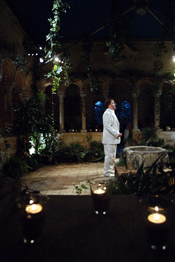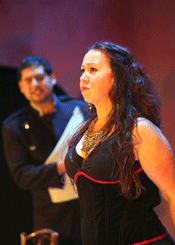Recently in Reviews
English Touring Opera are delighted to announce a season of lyric monodramas to tour nationally from October to December. The season features music for solo singer and piano by Argento, Britten, Tippett and Shostakovich with a bold and inventive approach to making opera during social distancing.
This tenth of ten Live from London concerts was in fact a recorded live performance from California. It was no less enjoyable for that, and it was also uplifting to learn that this wasn’t in fact the ‘last’ LfL event that we will be able to enjoy, courtesy of VOCES8 and their fellow vocal ensembles (more below …).
Ever since Wigmore Hall announced their superb series of autumn concerts, all streamed live and available free of charge, I’d been looking forward to this song recital by Ian Bostridge and Imogen Cooper.
The Sixteen continues its exploration of Henry Purcell’s Welcome Songs for Charles II. As with Robert King’s pioneering Purcell series begun over thirty years ago for Hyperion, Harry Christophers is recording two Welcome Songs per disc.
Although Stile Antico’s programme article for their Live from London recital introduced their selection from the many treasures of the English Renaissance in the context of the theological debates and upheavals of the Tudor and Elizabethan years, their performance was more evocative of private chamber music than of public liturgy.
In February this year, Albanian soprano Ermonela Jaho made a highly lauded debut recital at Wigmore Hall - a concert which both celebrated Opera Rara’s 50th anniversary and honoured the career of the Italian soprano Rosina Storchio (1872-1945), the star of verismo who created the title roles in Leoncavallo’s La bohème and Zazà, Mascagni’s Lodoletta and Puccini’s Madama Butterfly.
Evidently, face masks don’t stifle appreciative “Bravo!”s. And, reducing audience numbers doesn’t lower the volume of such acclamations. For, the audience at Wigmore Hall gave soprano Elizabeth Llewellyn and pianist Simon Lepper a greatly deserved warm reception and hearty response following this lunchtime recital of late-Romantic song.
Collapsology. Or, perhaps we should use the French word ‘Collapsologie’ because this is a transdisciplinary idea pretty much advocated by a series of French theorists - and apparently, mostly French theorists. It in essence focuses on the imminent collapse of modern society and all its layers - a series of escalating crises on a global scale: environmental, economic, geopolitical, governmental; the list is extensive.
For this week’s Live from London vocal recital we moved from the home of VOCES8, St Anne and St Agnes in the City of London, to Kings Place, where The Sixteen - who have been associate artists at the venue for some time - presented a programme of music and words bound together by the theme of ‘reflection’.
'Such is your divine Disposation that both you excellently understand, and royally entertaine the Exercise of Musicke.’
Amongst an avalanche of new Mahler recordings appearing at the moment (Das Lied von der Erde seems to be the most favoured, with three) this 1991 Mahler Second from the 2nd Kassel MahlerFest is one of the more interesting releases.
‘And there was war in heaven: Michael and his angels fought against the dragon; and the dragon fought and his angels, And prevailed not; neither was their place found any more in heaven … that old serpent … Satan, which deceiveth the whole world: he was cast out into the earth, and his angels were cast out with him.’
If there is one myth, it seems believed by some people today, that probably needs shattering it is that post-war recordings or performances of Wagner operas were always of exceptional quality. This 1949 Hamburg Tristan und Isolde is one of those recordings - though quite who is to blame for its many problems takes quite some unearthing.
There was never any doubt that the fifth of the twelve Met Stars Live in Concert broadcasts was going to be a palpably intense and vivid event, as well as a musically stunning and theatrically enervating experience.
‘Love’ was the theme for this Live from London performance by Apollo5. Given the complexity and diversity of that human emotion, and Apollo5’s reputation for versatility and diverse repertoire, ranging from Renaissance choral music to jazz, from contemporary classical works to popular song, it was no surprise that their programme spanned 500 years and several musical styles.
The Academy of St Martin in the Fields have titled their autumn series of eight concerts - which are taking place at 5pm and 7.30pm on two Saturdays each month at their home venue in Trafalgar Square, and being filmed for streaming the following Thursday - ‘re:connect’.
The London Symphony Orchestra opened their Autumn 2020 season with a homage to Oliver Knussen, who died at the age of 66 in July 2018. The programme traced a national musical lineage through the twentieth century, from Britten to Knussen, on to Mark-Anthony Turnage, and entwining the LSO and Rattle too.
With the Live from London digital vocal festival entering the second half of the series, the festival’s host, VOCES8, returned to their home at St Annes and St Agnes in the City of London to present a sequence of ‘Choral Dances’ - vocal music inspired by dance, embracing diverse genres from the Renaissance madrigal to swing jazz.
Just a few unison string wriggles from the opening of Mozart’s overture to Le nozze di Figaro are enough to make any opera-lover perch on the edge of their seat, in excited anticipation of the drama in music to come, so there could be no other curtain-raiser for this Gala Concert at the Royal Opera House, the latest instalment from ‘their House’ to ‘our houses’.
"Before the ending of the day, creator of all things, we pray that, with your accustomed mercy, you may watch over us."
Reviews
![William Purefoy as Xerxes [Photo courtesy of Iford Opera]](http://www.operatoday.com/Iford-William-Purefoy_-Xerx.gif)
12 Jul 2010
Handel’s Serse (Xerxes) at Iford Manor
Something rather extraordinary happened to opera seria in 1738. The
acknowledged master of that time, London’s George Frideric Handel,
presented two new operas at the King’s Theatre: Faramondo and
Serse.
They were stylistically very different and with the latter the
German-born composer threw caution to the winds both musically and
dramatically.
It was a bad call at the time as Serse flopped completely. The trouble was
that he dared to change a tried and tested formula: the wholly serious, or
tragic, seria format was infiltrated by comic or buffo
elements; he mixed characters of both high and low class within the drama, and
he even tinkered with the classic A-B-A da capo form of the arias. In
Serse much of the vocal music is in arioso form, which drives
the action forward more than the traditional, more musically complex da
capo format. All this was too much for London audiences at the time and
Handel lost money and soon after abandoned opera for the oratorio form. Luckily
for us, today we can appreciate his innovations and revel in them — as
indeed did the audience at Iford Opera in Wiltshire last Friday night.
 Andrew Radley as Arsamene [Photo courtesy of Iford Opera]
Andrew Radley as Arsamene [Photo courtesy of Iford Opera]
Once again, Iford Arts is to be congratulated for rising so magnificently
above the apparent limitations of its charming venue — one could indeed
argue that those very limitations of size and accessibility produce something
special time and again and last night was no exception. Iford encourages young
talent and in its regular offerings of Handel masterpieces in intimate
surroundings it also encourages the singers to concentrate on expression and
colour, as they do not need to worry about pushing their voices.
The usual convoluted Handel plot of misplaced affections, thwarted plans,
ladies (and men) in disguise and the triumph of love and duty (in varying
degrees) was efficiently translated into the tiny, greenery-draped colonnaded
space that is the delightful Iford Cloister by director David Freeman. Although
advertised as “Serse”, the opera was given in English and this
“Xerxes” was a translation/edit by Andrew Jones which revived
memories of the famous Hytner production of the 1980’s in its language,
if not its staging. The lively score, regretfully drastically abridged, was
offered in spicy miniature by the well-regarded players of La Nuova
Musica directed from the harpsicord by David Bates who encouraged some
really meaty, full-blooded playing from his 10 piece ensemble. In Acts I and II
the cast were somewhat depressingly attired in budget-store casuals with a bit
of sequin tat here and there to suggest royalty (one felt particularly for the
female singers who suffered very unflattering wardrobes — surely at odds
with the story?) but come Act III things improved a little. A few pyrotechnics,
many tiny candles, and a clever exploding model bridge (to take King Xerxes
across the Hellespont into Greece) made the most of the tiny stage area.
 Kristin Finnigan [Photo by and courtesy of Ralph Ripley]
Kristin Finnigan [Photo by and courtesy of Ralph Ripley]
More importantly, there was much to admire vocally with some excellent
singing from the young cast, many of whom are at the beginning of their careers
yet showed remarkable histrionic as well as musical abilities in this most
demanding of genres. There was no one outstanding performer, but we left with
perhaps three strong memories: the exciting contralto voice of young Kristin
Finnigan (Amastre) which promises to help revive the great tradition of this
most English of voice types, the impressive comic timing and agile baritone of
William Townend (Elviro) and the expressive warm-toned countertenor of Andrew
Radley (Arsamene). Verity Parker impressed with some spot-on high coloratura as
Romilda whilst also singing with some nice supple tone. She was contrasted
effectively with Kristy Swift in the soubrette role of Atalanta who
brought out the foxiness of this character with some sparkling high notes and
agile phrasing. Rather unusually, this production gave the title role to a
countertenor, the more experienced William Purefoy. These days, it’s more
often a mezzo soprano role (although written by Handel for a soprano
castrato of great renown, Caffarelli) but here at Iford the tiny stage
and proximity of the audience enables the less powerful countertenor voice to
take it on. Purefoy coped well enough with the high tessitura of this
demanding role, if not convincing us dramatically. His was no dangerously
vindictive King but rather a placid, slightly academic, royal. This was
particularly so in the scenes with his stage brother Prince Arsamenes, when
Radley acted for both of them. Purefoy is certainly a good singer (his
“rage” aria, Crudie furie in Act III was efficiently
despatched despite its huge demands on the singer) but rather miscast here.
The role of the bluff, if dim, General Ariodate was robustly taken by
baritone Jonathan Brown who made much of his limited role whilst contralto
Kristin Finnigan was forced to do the same. How one longed to hear more of
Amastre’s music and less of her creeping around the cloister, forever
listening to the plotting of others’ loves. Finnigan might just be
something special in the making — directors take note.
Cutting Handel is a fact of life — unpleasant but sometimes necessary
— but for this writer there were just too many “cuts too
far”. So many important, and lovely, arias went unheard. Everyone comes
to Iford by car (there is no evening public transport in this idyllic rural
location) so why not revel in more of Handel’s sublime music and get home
half an hour later? After all, another thirty minutes in this beautiful place,
with music of this quality, is hardly an imposition.
© Sue Loder 2010
Serse, by G.F. Handel continues on the 13th, 14th, 16th and 17th
July at Iford, near Bradford on Avon, Wiltshire, U.K. More information: www.ifordarts.co.uk
![William Purefoy as Xerxes [Photo courtesy of Iford Opera]](http://www.operatoday.com/Iford-William-Purefoy_-Xerx.gif)

